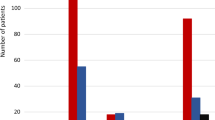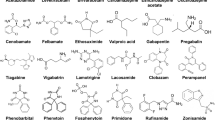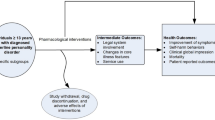Abstract
Background
Non-adherence to medications is a major determinant of poor outcome in bipolar disorder. Second-generation long-acting injectable (LAI) antipsychotics help ensure medication adherence which in turn can lead to more favourable outcomes. However, the role of these medications in bipolar disorder is not well established.
Objective
We sought to review available evidence relating to the efficacy and safety of using second-generation LAI antipsychotics in bipolar disorder.
Methods
PRISMA guidelines were followed to systematically review all clinical studies that reported on the efficacy and safety of second-generation LAI antipsychotics in patients with bipolar disorder. We searched Ovid Medline, PsycINFO, and Cochrane Central Register of Controlled Trials from inception to November 2018.
Results
Of 459 identified citations, 53 studies were fully evaluated and 37 met our inclusion criteria. Overall, second-generation LAI antipsychotics were found to be well tolerated and effective for treatment of manic symptoms and preventing mood recurrences in adults with bipolar disorder. However, we found disparity in the evidence available for individual agents. While several randomized controlled trials (RCTs) reported on the use of risperidone LAI in bipolar disorder, we found only one RCT on the use of aripiprazole LAI, and none for use of paliperidone palmitate or olanzapine pamoate (evidence for the former is limited to one observational study and one case series, and for the latter to a single case report). Studies in children and adolescents were restricted to case reports and small open-label studies.
Conclusion
Second-generation LAI antipsychotics, particularly risperidone and aripiprazole LAI, may be a safe and effective alternative to oral medications in the management of bipolar disorder.

(Adapted from Moher et al. [8])
Similar content being viewed by others
References
Yatham LN, Kauer-Sant’Anna M, Bond DJ, Lam RW, Torres I. Course and outcome after the first manic episode in patients with bipolar disorder: prospective 12-month data from the Systematic Treatment Optimization Program For Early Mania project. Can J Psychiatry. 2009;54(2):105–12.
Lingam R, Scott J. Treatment non-adherence in affective disorders. Acta Psychiatr Scand. 2002;105(3):164–72.
Sajatovic M, Valenstein M, Blow FC, Ganoczy D, Ignacio RV. Treatment adherence with antipsychotic medications in bipolar disorder. Bipolar Disord. 2006;8(3):232–41.
Yatham LN, Kennedy SH, Parikh SV, Schaffer A, Bond DJ, Frey BN, et al. Canadian Network for Mood and Anxiety Treatments (CANMAT) and International Society for Bipolar Disorders (ISBD) 2018 guidelines for the management of patients with bipolar disorder. Bipolar Disord. 2018;20(2):97–170.
Kane JM, Aguglia E, Altamura AC, Ayuso Gutierrez JL, Brunello N, Fleischhacker WW, et al. Guidelines for depot antipsychotic treatment in schizophrenia. European Neuropsychopharmacology Consensus Conference in Siena, Italy. Eur Neuropsychopharmacol 1998;8(1):55–66.
Kishimoto T, Nitta M, Borenstein M, Kane JM, Correll CU. Long-acting injectable versus oral antipsychotics in schizophrenia: a systematic review and meta-analysis of mirror-image studies. J Clin Psychiatry 2013/10;74(10):957–965.
Misawa F, Kishimoto T, Hagi K, Kane JM, Correll CU. Safety and tolerability of long-acting injectable versus oral antipsychotics: a meta-analysis of randomized controlled studies comparing the same antipsychotics. Schizophr Res. 2016;176(2–3):220–230.
Moher D, Liberati A, Tetzlaff J, Altman DG. Preferred reporting items for systematic reviews and meta-analyses: the PRISMA statement. Ann Intern Med. 2009;151(4):264–9.
Lähteenvuo M, Tanskanen A, Taipale H, Hoti F, Vattulainen P, Vieta E, et al. Real-world effectiveness of pharmacologic treatments for the prevention of rehospitalization in a finnish nationwide cohort of patients with bipolar disorder. JAMA Psychiatry. 2018;75(4):347–55.
Yan T, Greene M, Chang E, Hartry A, Touya M, Broder MS. All-cause hospitalization and associated costs in patients with schizophrenia or bipolar disorder initiating long-acting injectable antipsychotics. Curr Med Res Opin. 2018;34(1):41–7.
Clinebell K, Gannon J, Debrunner S, Roy Chengappa KN. Long-acting risperidone injections in a pregnant patient with bipolar disorder. Bipolar Disord. 2017;19(7):606–7.
Mendelson D, Goes FS. A 34-year-old mother with religious delusions, filicidal thoughts. Psychiatr Ann. 2011;41(7):359–62.
Brietzke E, Lafer B. Long-acting injectable risperidone in a bipolar patient submitted to bariatric surgery and intolerant to conventional mood stabilizers. Psychiatry Clin Neurosci. 2011;65(2):205.
Sengul C, Kalkanc Ö, Simsek D, Herken H. Maintenance electroconvulsive therapy combined with long-acting risperidone in the treatment of resistant bipolar affective disorder. J ECT. 2009;25(4):282–3.
Dratcu L, Bamelis D, Libretto SE. Risperidone long-acting injection, a promising treatment for patients with bipolar disorder. J Ment Health. 2005;14(5):523–9.
Hsieh MH, Chuang P, Wu C, Chang C, Chung P, Tang C. Bipolar patients treated with long-acting injectable risperidone in Taiwan: A 1-year mirror-image study using a national claims database. J Affect Disord. 2017;218:327–34.
Wu C, Hsieh MH, Tang C, Chang C. Comparative effectiveness of long-acting injectable risperidone vs. long-acting injectable first-generation antipsychotics in bipolar disorder. J Affect Disord. 2016;197:189–195.
Chan H, Huang C, Feng W, Yen Y. Clinical outcomes of long-acting injectable risperidone in patients with bipolar I disorder: a 1-year retrospective cohort study. J Affect Disord. 2016;205:360–4.
Savas HA, Yumru M, Özen ME. Use of long-acting risperidone in the treatment of bipolar patients. J Clin Psychopharmacol. 2006;26(5):530–1.
Macfadden W, Adler CM, Turkoz I, Haskins JT, Turner N, Alphs L. Adjunctive long-acting risperidone in patients with bipolar disorder who relapse frequently and have active mood symptoms. BMC Psychiatry. 2011;11(1):171.
Vieta E, Nieto E, Autet A, Rosa AR, Goikolea JM, Cruz N, et al. A long-term prospective study on the outcome of bipolar patients treated with long-acting injectable risperidone. World J Biol Psychiatry. 2008;9(3):219–24.
Malempati RN, Bond DJ, Yatham LN. Depot risperidone in the outpatient management of bipolar disorder: a 2-year study of 10 patients. Int Clin Psychopharmacol. 2008;23(2):88–94.
Han C, Lee M, Pae C, Ko Y, Patkar AA, Jung I. Usefulness of long-acting injectable risperidone during 12-month maintenance therapy of bipolar disorder. Prog Neuro-Psychopharmacol Biol Psychiatry. 2007;31(6):1219–23.
Bräunig P, Sacchetti E, Medori R. Risperidone long-acting injectable for maintenance therapy in bipolar disorder: an open-label pilot study. Int J Psychiatry Clin Pract. 2008;12(1):74–7.
Malempati RN, Bond DJ, Kunz M, Malemati C, Cheng A, Yatham LN. Long-term efficacy of risperidone long-acting injectable in bipolar disorder with psychotic features: a prospective study of 3-year outcomes. Int Clin Psychopharmacol. 2011;26(3):146–50.
Quiroz JA, Yatham LN, Palumbo JM, Karcher K, Kushner S, Kusumakar V. Risperidone long-acting injectable monotherapy in the maintenance treatment of bipolar I disorder. Biol Psychiatry. 2010;68(2):156–62.
Vieta E, Montgomery S, Sulaiman AH, Cordoba R, Huberlant B, Martinez L, et al. A randomized, double-blind, placebo-controlled trial to assess prevention of mood episodes with risperidone long-acting injectable in patients with bipolar I disorder. Eur Neuropsychopharmacol. 2012;22(11):825–35.
Macfadden W, Alphs L, Haskins JT, Turner N, Turkoz I, Bossie C, et al. A randomized, double-blind, placebo-controlled study of maintenance treatment with adjunctive risperidone long-acting therapy in patients with bipolar I disorder who relapse frequently. Bipolar Disord. 2009;11(8):827–39.
Bobo WV, Epstein RA, Lynch A, Patton TD, Bossaller NA, Shelton RC. A randomized, open comparison of long-acting injectable risperidone and treatment as usual for prevention of relapse, rehospitalization and urgent care referral in community-treated patients with rapid cycling bipolar disorder. Clin Neuropharmacol. 2011;34(6):224.
Yatham LN, Fallu A, Binder CE. A 6-month randomized open-label comparison of continuation of oral atypical antipsychotic therapy or switch to long acting injectable risperidone in patients with bipolar disorder. Acta Psychiatr Scand. 2007;116:50–6.
Chengappa KR, Turkin SR, Schlicht PJ, Murphy SL, Brar JS, Fagiolini A, et al. A Pilot, 15-month, randomised effectiveness trial of Risperidone long-acting injection (RLAI) versus oral atypical antipsychotic agents (AAP) in persons with bipolar disorder. Acta neuropsychiatrica. 2010;22(2):68–80.
Buoli M, Ciappolino V, Altamura AC. Paliperidone palmitate depot in the long-term treatment of psychotic bipolar disorder: a case series. Clin Neuropharmacol. 2015;38(5):209.
Martínez JS, Caballero ARS. Long-acting aripiprazole in comorbid bipolar disorder and borderline personality disorder and substance abuse. J Clin Psychopharmacol. 2017;37(2):266.
Calabrese JR, Sanchez R, Jin N, Amatniek J, Cox K, Johnson B, et al. Efficacy and safety of aripiprazole once-monthly in the maintenance treatment of bipolar i disorder: a double-blind, placebo-controlled, 52-week randomized withdrawal study. J Clin Psychiatry. 2017;78(3):324–331.
Calabrese JR, Sanchez R, Jin N, Amatniek J, Cox K, Johnson B, et al. Symptoms and functioning with aripiprazole once-monthly injection as maintenance treatment for bipolar I disorder. J Affect Disord. 2018;02(227):649–56.
Calabrese JR, Jin N, Johnson B, Such P, Baker RA, Madera J, et al. Aripiprazole once-monthly as maintenance treatment for bipolar I disorder: a 52-week, multicenter, open-label study. Int J Bipolar Disord. 2018.;6(1):14.
Chew MS, Dhillon R, Tibrewal P, Narang B. Olanzapine long-acting injection: When and for how long is oral supplementation required? Aust N Z J Psychiatry. 2013;47(12):1214–1215.
Karakoç Demirkaya S, Zoroğlu SS. Long-acting injectable risperidone use in an 11-years-old bipolar child. Noro Psikiyatr Ars. 2016;53(4):361–3.
Patel A, Malek N, Haq F, Turnbow L, Raza S. Hirsutism in a female adolescent induced by long-acting injectable risperidone: a case report. Prim Care Companion CNS Disord. 2013. https://doi.org/10.4088/PCC.12l01454.
Pope S, Zaraa SG. Efficacy of long-acting injectable antipsychotics in adolescents. J Child Adoles Psychopharmacology. 2016;26(4):391-394.
Fu-I L, Boarati MA, Stravogiannis A, Wang Y. Use of risperidone long-acting injection to support treatment adherence and mood stabilization in pediatric bipolar patients: a case series. J Clin Psychiatry. 2009;70(4):604–6.
Ceylan MF, Erdogan B, Hesapcioglu ST, Cop E. Effectiveness, adverse effects and drug compliance of long-acting injectable risperidone in children and adolescents. Clin Drug Investig. 2017;37(10):947–56.
Boarati MA, Wang Y, Ferreira-Maia AP, Cavalcanti ARS, Fu-I L. Six-month open-label follow-up of risperidone long-acting injection use in pediatric bipolar disorder. Prim Care Companion CNS Disord. 2013. https://doi.org/10.4088/PCC.12m01368.
Greene M, Yan T, Chang E, Hartry A, Touya M, Broder MS. Medication adherence and discontinuation of long-acting injectable versus oral antipsychotics in patients with schizophrenia or bipolar disorder. J Med Econ. 2018;21(2):127–34.
Calabrese JR, Vieta E, El-Mallakh R, Findling RL, Youngstrom EA, Elhaj O, et al. Mood state at study entry as predictor of the polarity of relapse in bipolar disorder. Biol Psychiatry. 2004;56(12):957–963.
Judd LL, Schettler PJ, Akiskal HS, Maser J, Coryell W, Solomon D, et al. Long-term symptomatic status of bipolar I vs. bipolar II disorders. Int J Neuropsychopharmacol. 2003;6(2):127–137.
Gigante A, Lafer B, Yatham L. Long-acting injectable antipsychotics for the maintenance treatment of bipolar disorder. CNS Drugs. 2012;26(5):403–20.
Emsley R, Chiliza B, Asmal L, Mashile M, Fusar-Poli P. Long-acting injectable antipsychotics in early psychosis: a literature review. Early Interv Psychiatry. 2013;7(3):247–54.
Author information
Authors and Affiliations
Corresponding author
Ethics declarations
Funding
No funding sources were used to prepare this review.
Conflicts of interest
Kamyar Keramatian and Trisha Chakrabarty state no conflicts of interest. Lakshmi Yatham has received research grants from or has been on speaker⁄advisory boards for Allergan, AstraZeneca, Alkermes, BristolMyers Squibb, Canadian Institutes of Health Research, Canadian Network for Mood and Anxiety Treatments, Dainippon Sumitomo Inc, Eli Lilly & Co., Forrest, GlaxoSmithKline, Janssen, Lundbeck, Michael Smith Foundation for Health Research, Novartis, Otsuka, Pfizer, Ranbaxy, Servier, Sanofi, Sunovion, the Stanley Foundation, Teva, and Valeant Pharmaceuticals.
Rights and permissions
About this article
Cite this article
Keramatian, K., Chakrabarty, T. & Yatham, L.N. Long-Acting Injectable Second-Generation/Atypical Antipsychotics for the Management of Bipolar Disorder: A Systematic Review. CNS Drugs 33, 431–456 (2019). https://doi.org/10.1007/s40263-019-00629-z
Published:
Issue Date:
DOI: https://doi.org/10.1007/s40263-019-00629-z




